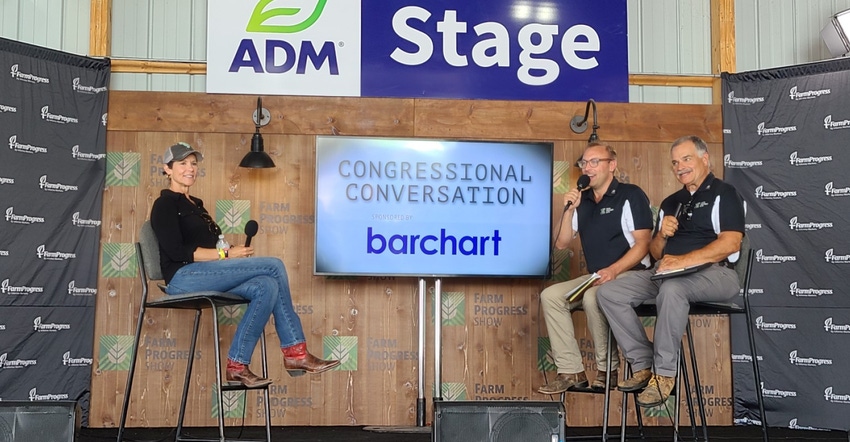
Congress has been working hard this summer on trying to advance an infrastructure package and then a broader Build Back Better plan, otherwise referred to as the budget reconciliation package. Rep. Cheri Bustos, D-Ill., shared at the Farm Progress Show in Decatur, Ill., on Tuesday she believes the House will advance the $1.2 trillion bipartisan infrastructure package separate from the $3.5 trillion reconciliation package, and farmers will benefit.
Bustos was optimistic for passage on September 27 of the bipartisan infrastructure package negotiated with President Biden and bipartisan senators, separate from a track being discussed by some on House leadership calling for it in tandem with the broader Biden administration wish list of the $3.5 trillion infrastructure.
“Now I can't say this is a 100% certainty, but my thought is that we are going to vote on that bill that was sent over without changes,” Bustos told an audience at the show. “As we make changes on it, we've got to send it back to the Senate for further negotiation. And the fact that we got a bipartisan bill to begin with, we feel pretty fortunate for that.”
Bustos, a democratic member who represents a district with over 10,000 farmers, says there are some people who wanted to see the Senate advance something different on infrastructure. She notes some House Democratic members felt it doesn’t go far enough, especially on environmental desires.
The Senate infrastructure bill includes $17 billion for ports and waterways, something of great importance to those in agriculture needing to get their products around the world. Bustos also touted the $2 billion for rural broadband of the additional $65 billion included in the infrastructure package. The infrastructure funds for road repairs also directly impacts farmers who are having to take detours and go way out of their way to get their commodities to market, she says.
While also attending the Farm Progress Show, Rep. Rodney Davis, R-Ill., was asked whether he would vote for the infrastructure bill. He says if the Senate’s infrastructure bill comes up as a stand-alone bill, he could see a bipartisan group of legislators support it. “But I don’t believe I’m going to get a chance to vote on an individual bill that's not going to be linked to the passage of $3.5 trillion and tax provisions that will devastate our family farms,” Davis says.
He says House Speaker Nancy Pelosi has shown a willingness to link these bills together. “There may be a separate vote eventually, but they’re linked together in their rhetoric. They’re linked together in their policies and they’re linked together in their strategy to put a total of $4.7 trillion of legislation through the House and into the Senate,” Davis says.
How to settle reconciliation
Both the Senate and House passed a $3.5 trillion framework on the budget reconciliation, but Bustos believes the amounts will be lower than that price tag as the committees begin to work on how they might spend that money.
“We don't know what that final number's going to be,” Bustos says. “The Biden administration and the Senate have looked at $3.5 trillion. I mean, it's just amazing that we're talking the ‘T’ word as opposed to billions. It's just unbelievable, these huge numbers.”
Senate Agriculture Committee Chairwoman Debbie Stabenow has said through reconciliation she’s working on how to allocate $135 billion under her jurisdiction focusing on expanding funding incentivizing climate smart ag practices, wildfires and nutrition. Meanwhile, Bustos says to expect closer to $80 billion for ag’s part in the larger reconciliation package.
Related: Ag democrats flesh out priorities for $3.5T reconciliation
On the House side, democrats can only lose three votes and still advance a reconciliation package along a party line vote which may keep proposals from going too extreme to either party’s wishes. “You can't get too far left and you can't get too far right, or it's not going to pass it all,” Bustos says.
Bustos says President Biden has required any reconciliation package be paid for and early proposals called on changes to stepped-up basis and estate tax changes. As she’s traveled around Illinois during the August recess, she says the issue of step up basis has been the No. 1 concern to farmers.
While approving the Senate framework on the budget reconciliation, 99 members voted in favor of ensuring that whatever is passed provides a carve out to protect family farmers.
Bustos says she’s had conversations personally with the White House about the negative impact a tax change could have on family farms’ ability to pass on a farm to the next generation. “I think we're going to end up in a good place. I think our family farmers will not be subject to harm when they're passing their family farm from one generation to the next,” she assures farmers.
About the Author(s)
You May Also Like






